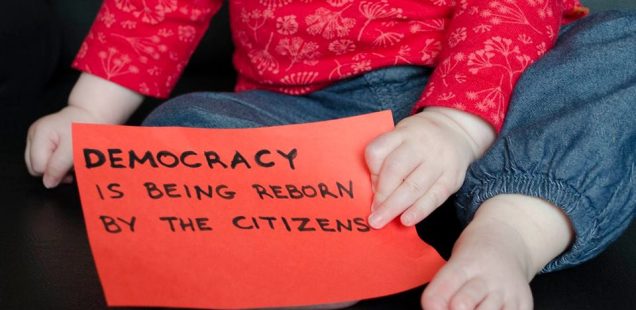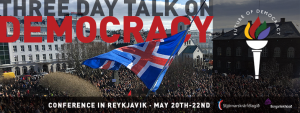The Future Of Democracy Rises In Iceland | PirateTimes

The Future of Democracy Emerges in Iceland
The crisis that knocked on Iceland’s door in 2008, turned out to be a “beneficial” fact for the country. It was beneficial because it abruptly and suddenly made Icelandic people question many things about politics and economics. Mainly, it made them realize that they should not leave their fate in the hands of politicians and bankers but should actively, themselves, participate in the democratic procedures and shape their future.
The massive awakening mobilized Icelandic people and resulted in the forming of many grassroots movements with new parties and new politicians emerging. The economic crash born personalities such as Birgitta Jonsdottir, a ‘poetician’ (poetry+politician), who was elected whilst running new parties (such as the Citizens’ Movement in 2009). Birgitta was also one of the founders of Pirate Party of Iceland, which is currently leading the polls as the largest party in Iceland.
Icelandic people currently have a campaign of “red cards” in their homes to protest the violations occurring in the terrain of politics. At the same time they invite people from around the world to send their own messages to Iceland on “red cards” using the hashtag #messagetoiceland and participate in an international dialogue on the future of democracy. “Politeia 2.0“, a platform for political innovation from Greece, the most southern part of Europe, sent some red cards too, one of those cards is the featured image of this article a baby holding a red card in his hands which says: “Democracy is being reborn by the citizens”.
The “awakening” also gave impetus to many innovative initiatives (such as digital platforms, social media, etc) that facilitate the direct participation of citizens in decision making. With the help of the collective intelligence the Constitutional Council was formed to write the first ever crowd sourced, citizen-made Constitution in the world. All those democratic methods and processes, that refers to a particular political behavior, have been recognized worldwide as “the Icelandic example”.
Above all it brought forth and highlighted very big and serious issues, such as the future of democracy through the functioning of the representative system. Through the years Icelandic people have experienced the faces of participatory democracy that give citizens the right to participate in public affairs and decision making. “The Icelandic example” inspired other citizens of other countries to emulate, develop, extend and experiment with it.
Utilizing this experience there is a three day international event (meeting and conference) in Reykjavik the coming weekend. The event goes under the name “The Future Of Democracy” and is organized by
- the “Constitution Society” – an NGO
- Katrin Oddsdottir – lawyer and human rights activist, one of the 25 members of the Constitution Council of Iceland
- Jón Ólafsson – professor of philososphy in the University of Iceland
- Eileen Jerrett – director
There are many participators from Europe and America and the event will end with a citizens meeting, based on the ideology of the National Assemblies which took place in Iceland after the crash, inviting citizens to visualize values which could underline a new and better society. There will be speeches by inspiring lecturers such as Lawrence Lessig (professor of law in Harvard University and very active in the civil rights movement), Helene Landemore (professor of political science), Katrin Oddsdottir and Birgitta Jonsdottir. At the event there will also be two Icelandic artists who will use the meeting to collect material for a project of writing a political opera related to the crash of 2008.
The Future of Democracy – day by day

Day1: Political Epistemologies – What has been done?
Political theorists have increasingly been discussing the quality of democratic approaches to policy- and decision-making in recent years. A central question has been whether democracy is essentially smart – i.e. whether increased democracy also improves solutions. Discussions of theoretical approaches to “intelligent democracy” and participatory planning of constitutional institutions by leading scholars, such as Lawrence Lessig (Harvard University).
Day 2: Democratic Experiments – What is being done?
Innovative “democratic experiments” from Europe (Finland, Greece, France) and USA will be presented, whilst maintaining the Icelandic example at the heart of the debate. In this workshop practicians, activists and researchers will present actual democratic experiments for discussion. The first half of the program focuses on Icelandic cases, the second half on experiments from around the world. The aim is to have a useful critical discussion of innovative projects and exercises. The day ends with a presentation and screening of the documentary film “A Blueberry Soup: How Iceland Changed the Way We Think about the World” directed by Eileen Jerret. Aferwards the film there will be a Q&A.
Day 3: Democracy in the Spotlight – what can be done?
220 persons from around the globe are expected to attend the meeting. The meeting will be hosted at the Reykjavik City Theatre and will look at the democracy of the future. It is open for everybody as long as there is space, so people are encouraged to show up early to get seats at the tables and be able to participate. Speeches by inspiring international academics, past/present politicians, and trailblazing democracy hub troubadors (see above for details). Soup can be bought in between two dynamic participatory talks which aim at investigating the next steps in Iceland as well as focus on the future of democracy as a concept.
The event will be lived streamed both through Borgarleikhúsið and citizen journalists via Periscope.
Featured image is copyrighted but used with permission

About Stathis Leivaditis
The English “pirate” is derived from the Greek word “πειρατής” (peiratēs) and this in turn from the verb “πειράομαι” (peiráomai), “I attempt”, which is a derivative of the noun “πείρα” (peîra), “experience”. Coming from the depths of the centuries, the word “pirate” took on another dimension in our days. The ruling classes saw pirates as rebels and hated them. Rebels without a state, they were not submissive to any law, except from the laws they instituted themselves, improvising together. This is the feeling of a Pirate: when something doesn’t work, you have to attempt to bring a new concept. Sometimes it goes beyond a certain point and perhaps exceeds certain limits, because it is an expression of challenge; the challenge to change the system. I’m a member of the Board (and former chairman) of Pirate Party of Greece, also a member of press team of PPGR, former journalist, now a free lancer. I’m in the team of Pirate Times from the start, I joined voluntarily and consciously because I am interested to meet pirates from around the world, to exchange views and spread the pirate spirit.
All content is CC-BY if not mentioned otherwise. Please link back to us if using content.













Antonio García García
Charly Pache
Eileen Jerrett